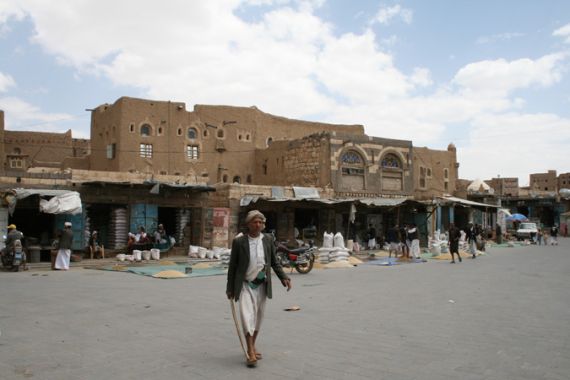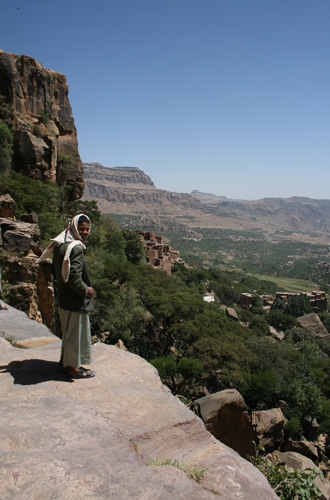Yemen’s biggest threat
Yemen is being flooded with counterterrorism dollars, but is its faltering economy a greater danger than terrorism?

 |
| Up to half of Yemenis live on $2 a day, but development assistance pales in comparison to military aid [Oliver Holmes] |
As the international community floods Yemen with millions of counterterrorism dollars, analysts fear the crux of the problem – Yemen’s struggling economy – is not receiving the attention it deserves.
Almost a year ago, Nigerian Umar Farouk Abdulmutallab attempted to blow up a plane flying to the US city of Detroit by concealing a bomb in his underwear. Having admitted that he trained under the local arm of al-Qaeda in Yemen, al-Qaeda in the Arabian Peninsula (AQAP), Abdulmutallab turned the eyes of the US and its allies squarely on this south Arabian state. And just last week, the UK and United Arab Emirates intercepted two packages containing explosive materials that were being shipped by air from Yemen to targets in the US.
This year, Washington bumped up military aid to Yemen to $155mn, and in September the Pentagon proposed a five-year package of $1.2bn for Yemen’s security forces. When compared to only $5mn in military aid to Yemen during 2006, the focus is quite clear – Washington is petrified that Yemen is becoming al-Qaeda’s new launching pad for attacks on the West.
But observers say it is Yemen’s worsening economic situation that will turn the country into a terror haven, and any amount of military spending is destined to fail and might even exacerbate the terror threat.
The UK-based think tank Chatham House has released a report saying Western policies in Yemen risk “drawing [Yemenis] towards radicalisation and militancy”.
“The priority attached to security-sector interventions undermines the balance of political and economic actions needed for this approach to succeed,” the report said. Instead, analysts say, the focus should be switched to the economy of the Arab world’s poorest state.
Economic woes
“Yemen’s failing economy will destroy the country, and it is not receiving the attention that counterterrorism and security gets,” says Yemen specialist Christopher Boucek of the Carnegie Middle East programme in Washington. “All you have to do is leave the airport and you realise that it is unemployment, subsidies, the failure to plan for a post-oil economy and corruption that are the biggest challenges.”
With the oil and gas industries accounting for 75 per cent of government revenues and 90 per cent of exports, the government of President Ali Abdullah Saleh has kept power through a system of political patronage to tribal sheikhs, fuel subsidies and paying public sector wages. But oil is dwindling – predicted to run out completely later this decade – and widespread corruption and security concerns have prevented the private sector from any beneficial growth.
Princeton University Yemen expert Gregory Johnsen says the economy should be the number one priority. “The way President Saleh has traditionally attempted to govern in Yemen means that a cash crisis sparks a political one,” he told Al Jazeera by email. “The economy is the foundation on which everything in Yemen is built, and as it continues to crack and crumble it exacerbates every other problem in the country.”
Now Sanaa faces its biggest challenge – what to do when it cannot pay off tribal sheikhs and state employees?
Fertile breeding ground
 |
| Poor, disgruntled Yemenis are recruited by groups like al-Qaeda [Oliver Holmes] |
“Unemployment is the radicalisation problem,” explained a high-level official working in economic development who spoke on condition of anonymity. “The economy is highly mismanaged due to the ineffectiveness of the government. You can clearly attribute the security problems in Yemen to the economy.”
Unemployment stands at 35 per cent and half of university graduates are jobless, creating widespread discontent.
A coffee farmer in the lush mountain ranges of the north says that most people are disillusioned with the central government, which they see as a corrupt hindrance to their livelihood. “I have to give half of my profits in bribes,” he explained at his coffee plantation. “At the end, I have hardly enough to live off.”
Many Yemenis have resorted to violence. In addition to al-Qaeda, Sanaa is also facing escalating violence from the Southern Movement, a loose coalition of groups demanding independence for the former South Yemen. North and South Yemen united in 1990 and fought a brief civil war in 1994. But separatists say that after unification, the north sucked all the wealth from the south to fill the pockets of corrupt officials in the northern capital.
President Saleh is also battling Shia Houthi rebels in the north, who complain of economic and social marginalisation – a six-year-long conflict that flared up again in July, sparking fears of an all-out war.
And with up to half of Yemenis living on $2 a day, many of them jaded by the central government, there is no shortage of recruits for the myriad militant groups.
Sheikh Abdullah al Jamili, from the northern province of al Jowf, says al-Qaeda targets poor, disgruntled people from his region. “Members of al-Qaeda prowl the streets looking for the poor. They provide them with food and shelter and ask them to come and discuss ideology at their homes.”
‘Lost in the desert’
Development assistance to Yemen pales in comparison to military aid. The Pentagon’s proposed five-year $1.2bn security package overshadows a three-year state department commitment of a mere $120mn in development aid.
The Friends of Yemen, an assembly of states that seeks to foster economic and political reform, met last September in New York. With a focus on development aid and better coordination of foreign aid, the group has been welcomed but there is still little in the way of firm commitments.
Alan Duncan, Britain’s minister of state for international development, told reporters after the meeting that it is difficult to pledge development aid to Yemen as “the country has not been able to show the capacity to use the funds”.
Some $3bn pledged at a 2006 donors’ conference has not yet been spent. Aid agency workers in the impoverished republic say corruption diverts foreign aid away from the needy to those with power.
“I have seen no evidence that would lead me to believe the international community or regional actors … have any vision for any sort of a strategy in Yemen,” says Yemen expert Johnsen.
“[Since] the attempted attack on an airliner over Detroit, the US is still lost in the desert in Yemen. The easy, almost reflexive answer has been to carry out air strikes, but this won’t solve anything.”